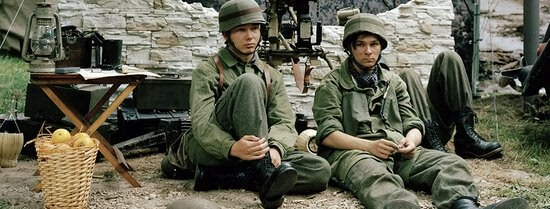Prof. dr. Stefan Berger (Ruhr Universität Bochum, Germany)
Stefan Berger (born 1964) is the Director of the Institute for Social Movements, Ruhr University Bochum, Germany, and Chairman of the committee of the Library of the Ruhr Foundation. He is Professor of Social History at the Ruhr University. Together with Prof. Christoph Conrad Berger is currently writing the final volume of the six-volume book series entitled ‚Writing the Nation: National History and National Identity in Nineteenth and Twentieth Century Europe’, which summarises the major results of the five-year, European Science Foundation-funded project ‚Representations of the Past: The Writing of National Histories in 19th and 20th Century Europe’ (2003 – 2008). He specializes in nationalism and national identity studies, historiography and historical theory, comparative labour studies, and the history of industrial heritage.
Recent relevant publications include:
Social Democracy and the Working-Class in Nineteenth and Twentieth-Century Germany, Longman, 2000, 287 pp.
Inventing the Nation: Germany, Edward Arnold, 2004, 274 pp.
Friendly Enemies: British-GDR Relations, 1949 – 1990, with Norman LaPorte. Berghahn Books 2010, 386 pp.
The British Labour Party and the German Social Democrats, 1900 - 1931. A Comparison, Oxford University Press, November 1994, 302 pp.; reprinted 2002.
Prof. dr. Alison Lansberg (George Mason University, Fairfax VA, USA)
Prof dr. Alison Landsberg is Professor and Associate Chair at the History and Art History Department at George Mason University in Arlington. She is an internationally recognized scholar in the field of memory studies, and author of the books Prosthetic Memory: The Transformation of American Remembrance in the Age of Mass Culture (Columbia UP, 2004), and Engaging the Past: Mass Culture and the Production of Historical Knowledge (Columbia UP, 2015). In her book Prosthetic Memory, she considers the way in which individuals are increasingly able to take on memories of events they did not live through. She is interested in the potential of such memories to produce empathy and to become the grounds for progressive politics. In her book Engaging the Past, she explores popular modes of engagement with the past in contemporary mediated society, and the ramifications of those modes of engagement for the projects of history and politics. Alison Landsberg has been invited to speak at conferences in Norway, the UK, the Netherlands, Italy, Germany and France. In 2007, the journal Rethinking History published a forum on her book Prosthetic Memory. She was previously an Associate Professor at the Department of History and Art History, George Mason University, from August 2006 until 2015 and before an Assistant Professor of American Cultural History and Film at the Department of History and Art History, at George Mason University, from August 2001 until 2006.
Other well-known publications include:
Landsberg, A. (forthcoming). Post Postracial America: On Westworld, the Smithsonian National Museum of African American History and Culture, Cultural Politics.
Landsberg, A. Ghosts on Screen: The Politics of Intertemporality. In: Spectral Spaces and Hauntings: The Affects of Absence, ed. Christina Lee, 2017. London: Routledge.
Landsberg, A. (2015). This isn’t usual, Mr. Pendleton, this is history: Spielberg’s Lincoln and the Production of Historical Knowledge, Rethinking History, 19 (3).
Landsberg, A. Politics and the Historical Film: Hotel Rwanda and the Form of Engagement. In: A Companion to the Historical Film, eds. Robert Rosenstone and Constantin Parvulescu, 2013. New Jersey: Wiley-Blackwell.
Robin De Levita (Robin De Levita Productions, The Netherlands)
Robin de Levita produced 3 feature movies, line produced more than 100 Tv shows, but is best known for producing more than 80 first class theater productions in 7 countries, including 17 Broadway and 4 West End productions, winning numerous international awards including Tony Awards for Titanic, 42nd Street and Into the Woods, plus a Laurence Olivier Award for The Who’s Tommy. In Europe Robin was responsible for many musical theater productions such as, The Lion King, Les Miserables, CATS, Miss Saigon, The Phantom of The Opera, Dance of The vampire, Blue Man Group, Chicago, Sweeney Todd, West Side Story, Cabaret, AIDA and many others. For 5 years he was part of the board of Stage Entertainment overseeing all theatrical productions World Wide.
De Levita has in recent years become famous for his use of innovative staging techniques. As a producer of Soldier of Orange (the longest running musical in Dutch history), De Levita created a rotating auditorium. For the play ANNE he invented a new system that seamlessly integrates video with moveable and rotating stages. Both shows use ground breaking staging concepts that challenge the relationship between the performance and the audience. Prizes/Awards Tony nominations for Cyrano ñ The Musical, 42nd Street, The Music Man, Urinetown and Into the Woods. Received an Outer Critic Award for Victor Victoria. Received Tony Awards for Titanic (Best Musical), 42nd Street (Best Revival), Into the Woods (Best Revival) and a Laurence Olivier Award for The Whoís Tommy. In 2012 Robin teamed up with media entrepreneur Kees Abrahams and formed Imagine Nation.
